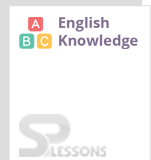 Description
Description
An expression, word or phrase that has a non-literal meaning that is understood in regard to a typical use of that expression that is separate from the exacting significance or meaning of the expressions of which it is made is known as an idiom.
A gathering of words that stand together as a solitary unit, normally as a major aspect of a clause or a sentence is called as a phrase.
 Concept
Concept
Idioms
There are two types of idioms. They are: -
1. Selecting the correct meaning of the given idiom.
2. Selecting the correct meaning of an idiom as used in a sentence.
Type 1: Selecting the correct meaning of the given idiom - An idiom is given followed by four choices, in this type of questions. The candidate is required to select that choice which exactly expresses the meaning of the given idiom.
Example - A fair crack of the whip (Railways, 1995)
Solution - The idiom 'A fair crack of the whip' means 'A period of importance'.
Type 2: Selecting the correct meaning of an idiom as used in a sentence - A sentence is given in which an idiom has been italicised followed by four choices, in this type of questions. The candidate is required to select that choice which best expresses the meaning of the italicised idiom.
Example - The mealy-mouthed politician succeeded in influencing the voters. (Asstt. Grade, 1992)
Solution - The idiom 'mealy-mouthed' means 'cunning'.
Phrases:
Similarly, there are two types of phrases. They are: -
1. Selecting the meaning of a phrase as used in a sentence.
2. Use of phrases to fill in the blanks.
Type 1: Selecting the meaning of a phrase as used in a sentence - A sentence is given in which a phrase has been italicised followed by some choices, in this type of questions. The candidate is required to select that choice which best expresses the meaning of the italicised phrase.
Example - He has come up during the last five years. (Stenographers' Exam, 1991)
Solution - The phrase 'come up' means 'risen in status'.
Type 2: Use of phrases to fill in the blanks - Four phrases are given and labelled a, b, c and d, in this type of questions. to fill in the blanks in some sentences that follow, these phrases present as choices. The candidate is required to examine each phrase in context of the given sentence and then select the most effective one as his answer.
Example - (Hotel Management, 1995)
The soldier has no choice but to ________ his officer's orders.
a. Carry away
b. Carry out
c. Call out
d. Call for
Solution - Carry out is the best choice that fits into the blank.
 Model Questions
Model Questions
1. Select the one which best expresses the meaning of the given idiom/proverb. (S.B.I.P.O. 1984)
To wrangle over an ass's shadow.
A) To act in a foolish way
B) To quarrel over trifles
C) To waste time on petty things
D) To do something funny
Solution: B
2. Select the one which best expresses the meaning of the given idiom/proverb. (Railways, 1991)
Hobson's choice
A) Feeling of insecurity
B) Excellent choice
C) Feeling of strength
D) Accept or leave the offer
Solution: D
3. Select the one which best expresses the meaning of the given idiom. (S.B.I.P.O. 1984)
To fly off the handle
A) To take off
B) To be different
C) To lose one's temper
D) To dislocate
Solution: C
4. Select the one which best expresses the meaning of the given idiom. (Bank P.O. 1988)
To keep the ball rolling
A) To keep the conversation going
B) To work constantly
C) To earn more and more
D) To make the best use of
Solution: A
5. Select the choice which best expresses the meaning of the idiom. (Railways, 1995)
To keep the wolf away from the door
A) To keep alive
B) To keep off an unwanted and undesirable person.
C) To keep away from extreme poverty
D) To hold the difficulties and dangers in check.
Solution: C
6. Select the choice which best expresses the meaning of the idiom/phrase.
To give a rap on the knuckles.
A) To eulogise
B) To chatise
C) To condemn
D) To rebuke
Solution: D
7. Select the one which best expresses the meaning of the idiom/phrase in italics. (Asstt. Grade, 1992)
The boy turned a deaf ear to the pleadings of all his well-wishers.
A) Listened carefully
B) Did not pay any attention
C) Was deadly opposed
D) Posed indifference
Solution: B
8. Select the one which best expresses the meaning of the phrase in italics. (N.D.A. 1995)
Last evening I was held up at the manger.
A) Detained
B) Kept
C) Stopped
D) Delayed
Solution: A
9. Select the best which best expresses the meaning of the phrase in italics. (I.Tax, 1994)
We should do away with the present examination system.
A) Prohibit
B) Demolish
C) Extend
D) Abolish
Solution: D
10. Select the one which best fits into the blank in the given sentence.
The occasion ________ prompt action
A) Call up
B) Call for
C) Call out
D) Call to
Solution: B





